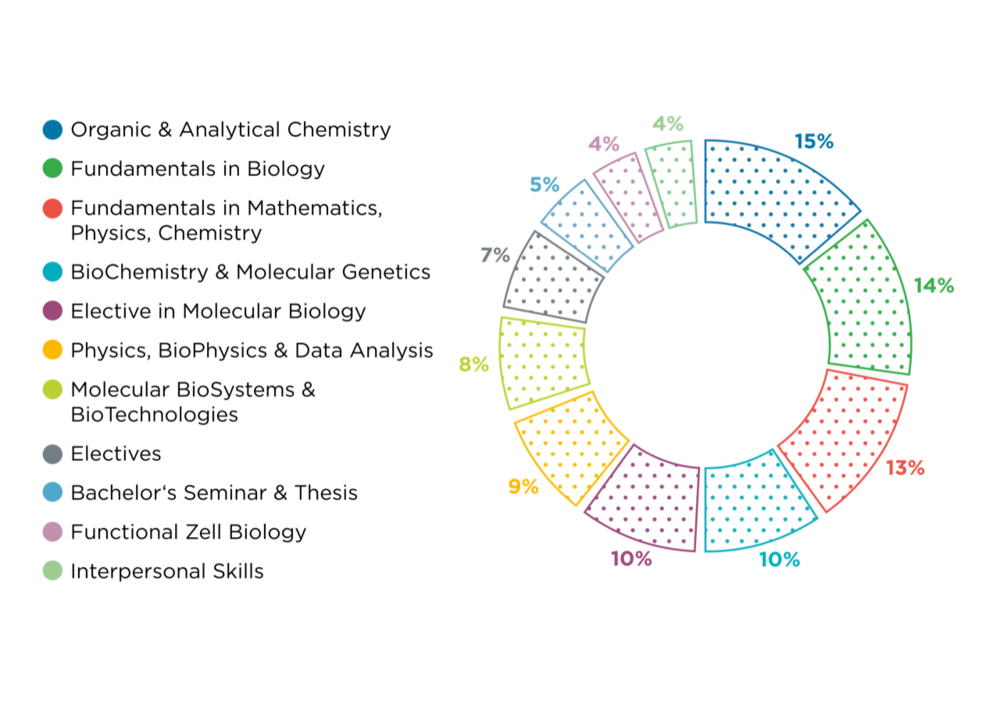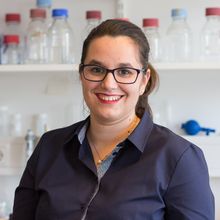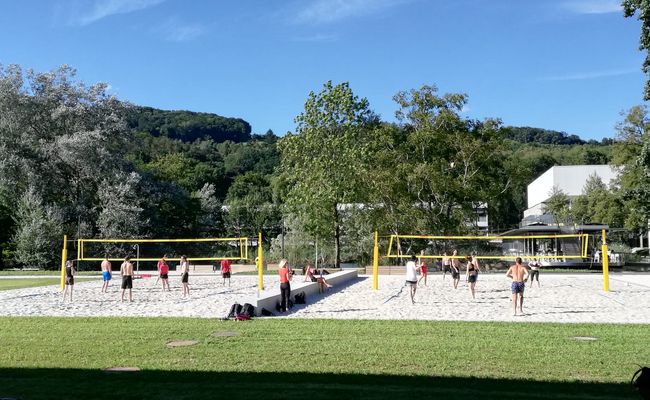No. You can commute quite easily using public tranportation.
What role does DNA play in shaping your life? How does a healthy cell turn into a cancerous cell? Your degree in Molecular BioSciences can help you answer these questions and more.
The interdisciplinary Bachelor's degree program in Molecular BioSciences gives you an opportunity to focus on issues in the fields of molecular biology, molecular genetics, immunology, chemistry, physics and biophysics.
The program is about your body's processes on a molecular level (i.e., how do nerve cells communicate, how does your heart beat, why can a virus attack you) asd well as about the basic building blocks of life: DNA, RNA and proteins.
The JKU and the University of Salzburg have come together to offer you a program that features a broad curriculum and includes applied practice!
Page Content
Key Facts
Degree
Bachelor of Science (BSc)
Duration
6 semesters
Locations
Linz and Salzburg
ECTS
180 credits
Language
German
Program
Full-Time
-
Register to Enroll Prospective students must be admitted to the program at the Paris Lodron University of Salzburg (register to enroll online).
Register Now , opens an external URL in a new window
Why This Degree Is Particularly Attractive
- Your education in Molecular BioSciences is interdisciplinary and broad-based, allowing you to acquire expertise in biology and natural sciences by studying at two renowned Austrian universities, one in Linz and the other in Salzburg.
- Your interests matter: Choose electives so you can focus on your individual area(s) of interest
- Acquire hands-on, real-world experience during your studies: Work on applied practice skills as part of a small group and take advantage of the opportunity to get one of many available internships.
The Bachelor's degree program in Molecular BioSciences consists of the following areas:

Molecular BioSciences: Main Areas of Focus
Students in the Molecular BioSciences program focus in-depth on the following core areas:
- Genetics and Molecular Biology: Learn more about the way your is built from a molecular perspective and how your DNA shapes your life.
- Chemistry and BioChemistry: Learn how chemical signals control your body and how you can demonstrate this experimentally.
- Physiology, Cell Biology, and Microbiology: Analyze life down to the smallest units, including structure, and communication.
- Immunology: Understand the way your body's defense mechanisms work when fighting outside pathogens (bacteria, viruses,..), what happens when one's immune system is out of balance (autoimmune diseases), and how you can protect your body (vaccines, nutrition,...).
- Physics and Biophysics: Acquire the skills required to physically explain, understand and detect biological processes..
- Genomics and Proteomics: Understand the relationship between DNA mutations, protein malfunctions and human diseases.
- BioTechnologies: Learn about methods to analyze and modify DNA, RNA and proteins (CRISPR/Cas9, PCR, cloning, rapid tests,...).
- Soft Skills: Learn how to create an effective resume, science ethics and presentation techniques.
What You Learn in the Molecular BioSciences Program at the Uni
Graduates of the Bachelor's degree in Molecular BioSciences acquire an understanding of "inquiry-based learning" principles and hone the ability to critically question and challenge scientific statements, conclusions, and assertions. Graduates can conduct research and address complex questions on a cellular and systemic level due to their extensive and solid educational background.
During the program, you will also become more aware of ethical and gender-specific aspects in your work, acquire a strong social skill set, and be able to present your work publicly in both German and English.
Did you know that ...?
...in lieu of the Coronavirus pandemic, the public is just now recognizing routinely conducted basic principles in the field of molecular biology conducted in labs over the past decades?

Your Career Prospects
Program graduates can pursue careers in:
- Conducting base-knowledge research & development at universities or universities of applied sciences
- Research and development in the field of medicine and pharmaceuticals
- Biotechnology, bioanalytics, and medical-diagnostic analytics
- Quality management and quality control
- Media and PR work in the field of new molecular biotechnologies
- Adult education (continual education programs)
Register to Enroll
Requirements
- General higher education entrance qualifications (such as an Austrian "Matura" diploma or a German "Abitur")
- Please note that students must be admitted to the program by the Paris Lodron University of Salzburg (register to enroll online, opens an external URL in a new window)
Contact the Admissions Office for additional information about the admissions procedure.
Still have questions?
Then contact us!
Department
Admissions Office
Building
-
Your First Steps at the University of Salzburg
Start Your Studies , opens an external URL in a new window
Frequently Asked Questions
Of course! Initial base-knowledge classes in mathematics/physics/chemistry focus on giving students a solid background and foundation!
As an interdisciplinary degree program, Molecular Biosciences focuses strongly on subject areas such as chemistry and physics. We can provide individual support to ensure students are well prepared for future professions and occupations.
The Bachelor's degree program in Molecular BioSciences covers a wider range of disciplines in the area of natural sciences. The Biological Chemistry program focuses more on areas in chemistry.
Register to enroll in the Bachelor's degree program Molecular BioSciences directly at the University of Salzburg.
Still Have Questions?
Do you need help registering or do you have questions about the program? Contact the JKU's Office of Student Information and Academic Advising (SIBS)!
STAY UP-TO-DATE
... and sign up to receive the JKU Newsletter for prospective students! Everything you need to know about studying at the JKU, upcoming events. and what's new.
Advanced Degrees at the JKU
After completing your undergraduate degree, you can continue your education by pursuing an advanced degree:
Similar Degree Programs
You might also find these academic degree programs interesting:
-
All Bachelor's and Diploma Degree Programs
Overview
Student Housing at the JKU Campus
Recreation at the JKU Campus




